Nature conservation sets a precedent
In March 2017, the Frankfurt Spring School on Project Conservation Management took place for the very first time for bioscience students and students from related disciplines together with Goethe University Frankfurt and the Frankfurt Zoological Society (FZS).
The course aims to share knowledge on the operational aspects of nature conservation work. The curriculum includes methods of project development and planning as well as budgeting, human resources, communication and how to deal with cultural challenges. The lecturers are experienced professionals from international NGOs and conservation organisations.
KfW Stiftung funds six scholarships for dedicated employees from national park authorities or for park managers from Latin America, Africa and Asia. The scholarship holders participate in the programme and develop a project idea for their park or authority during this time. The finalised ideas are assessed by a jury at the end of the course and up to three of the best projects receive financial support to implement their goals.
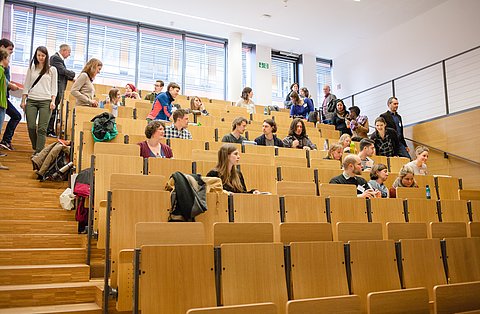
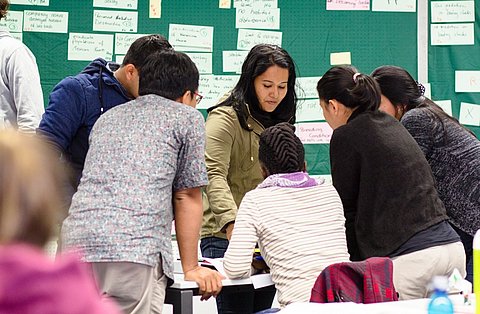
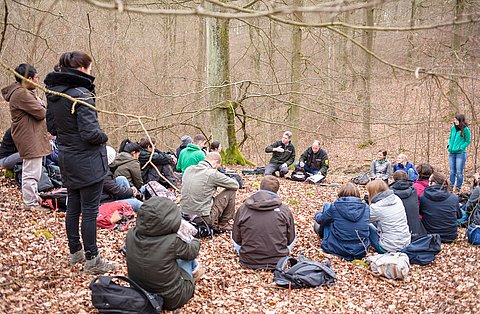
Frankfurt Spring School on Conservation Project Management
2025
This year, KfW Stiftung once again sponsored the participation of six international scholarship holders from the selected NGO cooperation partners Conservation International (CI), Wildlife Conservation Society (WCS) and Frankfurt Zoological Society (ZGF). All scholarship holders applied with project ideas they had developed themselves.
- Jacob Mphasi aus Sambia (ZGF)
- Isnaini Marliana aus Indonesien (WCS)
- Christelle Razafindrakoto aus Madagaskar (WCS)
- Godbless Monyo aus Tansania (ZGF)
- Alex Stewart aus Guyana (ZGF)
- Asri Puji Lestari aus Indonesien (CI)
After the official end of the programme on 23rd of March and the presentation of the certificates, the scholarship holders worked on finalising their project ideas with the support of an experienced consultant. At the jury meeting, three project ideas were each awarded a grant of 50,000 euros. Alex Stewart, Christelle Razafindrakoto and Jacob Mphasi were selected as the winners.
With his project, Alex Stewart plans to preserve the population of the giant otter by reducing fishing in the Kanuku Mountains conservation area (Guyana). His project involves setting up aquaculture farms and monitoring fishing practices in rivers. The results will feed into recommendations for sustainable fishing practices that benefit local livelihoods and the ecosystem.
Christelle Razafindrakoto works for the protection of sharks and rays in Antongil Bay (Madagascar). Her project involves scientific monitoring of populations and working with local communities to raise awareness of conservation and sustainable fishing practices.
Jacob Mphasi wants to improve fence management in the North Luangwa National Park (Zambia) to protect the highly endangered black rhino. The project aims to identify damaged sections of fence more efficiently and test innovative methods that allow natural wildlife movement while ensuring rhino conservation.
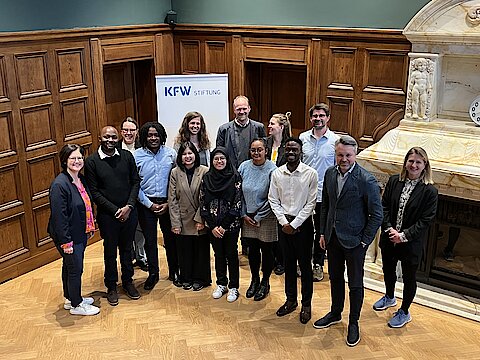
2024
This year, the Frankfurt Spring School took place for the seventh time. All KfW Stiftung's scholarship holders once again come from the Legacay Landscape Fund regions. They applied with a wide range of project ideas. The importance of indigenous communities for nature conservation is increasingly coming to the fore in the projects of our scholarship holders.
This year, the following projects are being funded with 50,000 euros:
Isabel Porras will collect the knowledge of the older generation of the indigenous Yine community in the Altu Purús National Park in the Madre de Dios region of Peru and present it in modern formats - including a podcast - in an exciting and new way for the younger generation. The aim is to document the invaluable knowledge of their own culture in a sustainable way and to awaken new interest in their own traditions.
Manjary Andriatsitohaina will support local structures (Community-Base-Initiatives, CoBas) in using the existing natural resources in the Marika Natural Park in Madagascar more sustainably to enable better living conditions. The aim is to create a new understanding of local nature through training over several days and to promote the local population's own initiative through better management of the structures.
The third project support goes to Bester Muzeya and Penelope Konkola together. Both work in the North Luanga National Park in Zambia and both project approaches deal with the topic of sustainability, food security and health care for the local population. By merging the two project ideas, gardens and fishponds will now be created for two communities. The fishponds provide a sustainable source of protein and protect the nearby river from overfishing, while the newly created gardens are intended to contribute to dietary diversity and can be better protected from floods and wild animals thanks to their proximity to the villages.
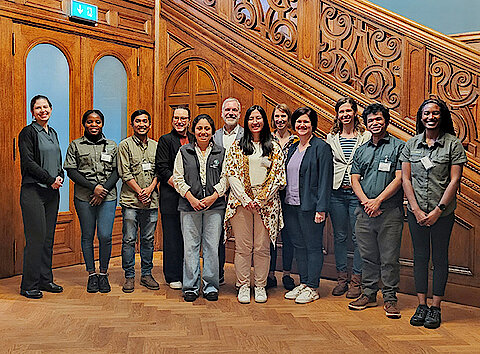
2023
Together with our partners, we welcomed scholarship holders and 23 other students to the four-week seminar at the Frankfurt Spring School for the sixth time in March. The participants gained insights into the work of international experts in nature conservation management. They acquired knowledge about project management, budget planning, personnel, communication and organizational development.
In the following weeks, the six KfW Stiftung scholarship holders from international protected areas of the Legacy Landscape Fund worked intensively with a consultant who helped them to structure their project ideas in the specific form they had learnt and to prepare a jury presentation.
At the final jury meeting, the projects which were each awarded 50,000 euros for their realization are:
- Monica Jaramillo, who presented the ‘Amazon Reporters’ communication project with indigenous peoples in Colombia. The aim of the project is to preserve the ecological and traditional knowledge as well as the indigenous languages of the older generations and to pass it on to the younger generation using modern media such as podcasts and videos.
- Diana Paredes, who wants to develop a threat analysis for the southern part of the Yasuní National Park in Ecuador together with the indigenous people living there. Based on this, a participatory approach will be used to implement measures over the course of the project that will have a direct impact on living conditions and improve them.
- Hasina Rabe from Madagascar, whose project focusses on the lemur species Silky Sifaka, of which only 250 animals remain in the Makiru National Park in Madagascar. The focus here is on reducing the threats to the species caused by deforestation. This goal is to be achieved together with the local population.
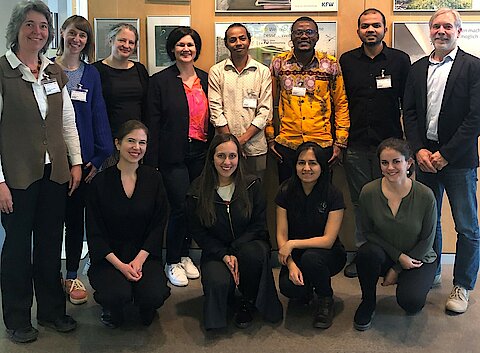
2022
After a year's break, we were very happy that the Frankfurt Spring School could take place in autumn 2022 after a delay. For the first time, our scholarship holders all came from protected areas of the Legacay Landscape Fund. These protected areas are among the most biodiverse areas on earth and receive funding for the next 30 years through the Legacy Landscape Fund endowment.
Our scholarship holders again had very interesting project ideas in their luggage, which they developed further during their stay together with the experts and other students. In the end, the jury selected three projects that will receive additional funding for implementation from KfW Stiftung:
- Improving human wildlife co-existence in communities surrounding Gonarezhou National Park, Zimbabwe by Rumbidzai Magwiro
- Environmental and social monitoring of natural resources management initiatives in Madidi Landscape, Bolivia by Natalia Merida
- Improving connectivity of the Indigenous Territory of La Victoria to the Legacy Landscape of Chiribiquete by Andrés Giraldo
The projects will be implemented by fellows over the next 12-18 months.
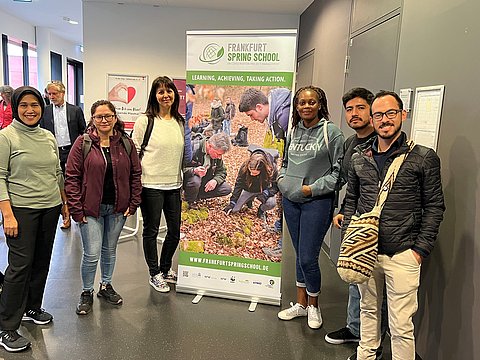
2020
This year it is already for the fourth time that „Frankfurt Spring School“ takes place. From 24th February until 20th March young academics learn how to combine their scientific knowledge with management skills. Goethe University, WWF Germany and Frankfurt Zoological Society have once again set up a four-week programme that has a lot to offer. The seminars range from project management, financial reporting, organisational strategies to communication skills. Also, an
excursion to the national park “Kellerwald” is planned in order to discuss and apply the acquired knowledge in a more practical context.
KfW Stiftung (Foundation) has granted six conservationists from Peru, Paraguay, Zambia, Tanzania, Malaysia and Vietnam a scholarship to partake in this unique training. But the Stiftung’s support extends even beyond the Spring School: Each scholarship holder receives individual training for project development. With the support of professionals the participant works on their own project proposal in detail. Every proposal aims at improving conditions in a conservation area in the respective home country. Finally, all scholarship holders present their proposal in front of a jury which selects up to three projects.
Each chosen project is rewarded with a sponsorship of 50,000 Euros for its implementation:
- Monica Paredes and Frankfurt Zoological Society are jointly responsible for the conservation of the Amazonian Manatee in Peru's Yaguas National Park.
- Patricia Roche and the WWF are building up the strengthening of key stekeholdern in Paraguay for the effective joint management of the Rio-Negro National Park.
- As a Pilot for the North Luangwa Ecosystem in Zambia, Francis Mapenga is working with the Frankfurt Zoological Society to reduce elephant-human Conflict in the Mukungule Game Management area.
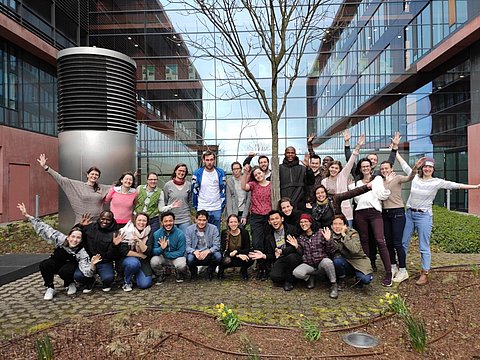
2019
The Frankfurt Spring School has taken place for the third time in 2019 in cooperation with the Goethe University and the Frankfurt Zoological Society. Among the 30 participants there were again 6 fellowship holders from the foundation KfW Stiftung who were able to gather knowledge in the fields of Nature Conservation Work, Accounting, Project Development and Intercultural Competence during the four-week course.
This year, the six fellowship holders came from Brazil, Guyana, the Democratic Republic of Congo, Zambia, Tanzania and Indonesia. Building on the input of the Spring School, the aspiring park managers have developed their own project ideas for their respective conservation area following the course. At the end of the intensive training and additional individual mentoring, a jury evaluated the applications. Three projects were selected and received funding of up to EUR 50,000:
In Tanzania Regina Domonko carries out a project which aims at stopping deforestation in Tanganyika District through opening up alternative sources of income through beekeeping for the local population. Wildlife corridors can be saved and maintained by her project.
In the Indonesian island of Sumatra Andhani Hartanti will investigate how survival skills of infant borns of reintroduced orangutans can be improved.
The aim of Carolina Siqueira’s project is to make sustainable use of the Brazilian Savannah, called Cerrado, by including the locals and respecting the savannah’s biodiversity.
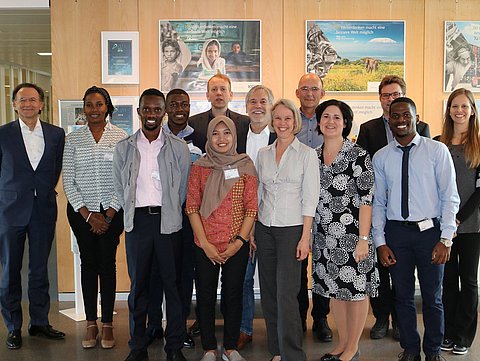
2018 – Insight into the second year of the program
The first year of Frankfurt Spring School had turned out to be a great success. Therefore, in February 2018 Goethe University and FZS for the second time invited 30 international students and young professionals of biology and associated disciplines to come to a snowy Frankfurt. In the course of four intense weeks the participants gained basic knowledge of conservation work. The modules in Accounting, Project Development as well as Intercultural Competence were complemented by excursions into the field of daily conservation work – the group visited e.g. KfW in Frankfurt in order to learn more about the work of KfW Development Bank and the role of Human Resources in a project context. The school was concluded by a workshop with Andrew Zaloumis, awardee of the KfW-Bernhard-Grzimek-Preis 2017 and former CEO of iSimangaliso Wetland Park Authority in South Africa.
This year’s six holders of the KfW Stiftung fellowship came from Vietnam, Madagascar, Tanzania, Ethiopia, Peru and Ecuador. Building on the input of the Spring School, in the following days the aspiring park managers were developing their own project ideas for their respective conservation area. After further individual intensive training and mentoring, a jury selected three projects that will now receive a funding of up to 100.000 EUR:
"Bee keeping for sustainability in villages adjacent to Serengeti National Park, Tanzania” by Joyce Mungure
"Strengthening the conservation of the Yellow-Spotted river turtle (Podocnemis unifilis) in the Heath River basin, Peru / Bolivia" by Kevin Ibañez Saravia
"Conservation of bottlenose dolphins (Tursiops truncates) at Puntilla de Santa Elena Wildlife Reserve, Ecuador” by Jennifer Montoya Lopez
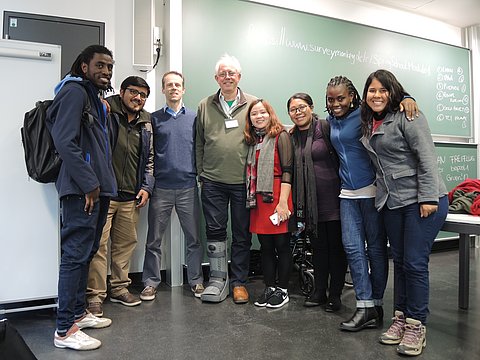
GEO Biodiversity Day
2017 – Impression from the first year
n spring of 2017, we were able to welcome scholarship holders from Peru, Guyana, Zimbabwe, Nepal and Indonesia in Frankfurt.
For all of them it was their first visit to Europe and accordingly they were all a little nervous on the first day. In addition to students from various German universities, there were participants from Prague and Vienna in the course. Their nervousness quickly disappeared on the second day when the course immediately started with an introduction into the Logical Framework method, demanding everyone’s attention.
The presence of the international scholarship holders was a real gain for the entire course, as they are already actively involved in nature conservation in their home countries and thus contributed valuable information from their experience in the field.
After four weeks of learning about many different topics, the participants had to take a final exam which all of them passed.
During an additional week following the Spring School course, the international scholarship holders of KfW Stiftung worked on the project idea with which they had competed for the scholarship and now successfully applied the new methods they had learned.
A jury of experts selected three of the presented plans for implementation.
Roxana Rojas will carry out her project in Peru to reduce the human-wildlife conflict between the population living in the Manu National Park and the Andean bear.
Sara Henry from Guyana will administer a structural project to establish systematic planning and implementation processes for nature reserves in her country.
Lovelater Sebele will address the topic of commercialisation vs. nature conservation in Zimbabwe.
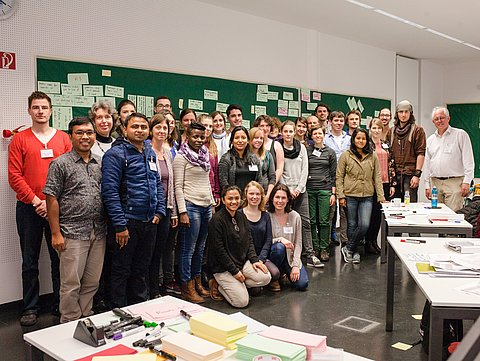
Programme Management
Pia Puljanic
Photo credits:
01. IImage: Source: ZGF, Author / Photographer: Jeldrik Schröer
02. Image: Source: ZGF, Author / Photographer: Jeldrik Schröer
03. Image: Source: ZGF, Author / Photographer: Jeldrik Schröer
04. Image: Source: KfW Stiftung / Author / Photographer: Dr. Stephan Sperl
05. Image: Source: ZGF; Author / Photographer: Stephanie Kalberer
06. Image: Source: KfW Stiftung; Author / Photographer: Ruben Armbruster
07. Image: Source: Goethe-Universität, Author / Photographer: Prof. Meike Piepenbring
08. Image: Source: ZGF; Author / Photographer: Jeldrik Schröer
09. Image: Source: KfW Stiftung; Author / Photographer: Pia Puljanic
10. Image: Source: KfW Stiftung, Author / Photographer: Salar Baygan
11. Image: Source: KfW Stiftung; Author / Photographer: Louisa Serwuschok